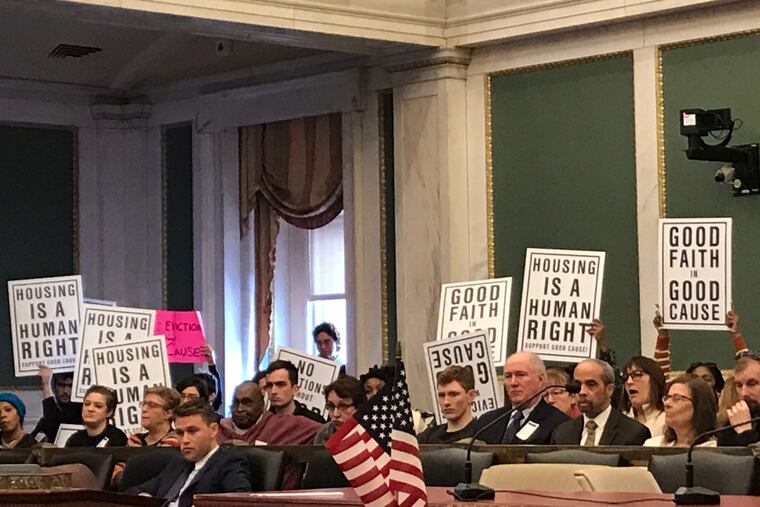Task Force has 17 ideas for fixing Philly’s eviction problem
In Philadelphia last year, there were 22,500 eviction filings. That's 1 for every 14 renters.

The city's Eviction Task Force issued recommendations to Mayor Kenney on Tuesday, calling for more robust mediation programs between landlords and tenants, a one-stop resource center for tenants facing evictions, and a small-loan program for low-income landlords.
Last year in the city there were 22,500 eviction filings. That's 1 for every 14 renters. Not all of those filings resulted in renters having to move but the data also does not include illegal lockouts and informal evictions. Nationally, aging housing stock, rising rental costs, and a lack of affordable units have created a crisis for renters.
About 45 percent of city residents rent their housing.
The 22-member task force met monthly for eight months to produce the report, which includes 17 recommendations in four categories: education, resources, housing standards and legal processes. At a news conference Tuesday, Kenney said the city would work to implement some of the ideas.
"We're trying to create some greater flexibility in the process so we can get as close to a win-win situation as possible," said Liz Hersh, the director of the Office of Homeless Services. "Whether it's getting repairs that are needed, whether there's financial assistance available, whether its coming to some agreement about what is an adequate rent to be paid, we're trying to expand the options available to landlords and tenants so that the only logical outcome isn't an eviction."
>>READ MORE: Why 1 in 14 Philly renters faces eviction every year
One of the more immediate steps the task force suggested the city take: Create a single portal for all eviction-prevention services. "We have sources of information but you have to chase around after them," Hersh said.
Failure to pay rent is the main cause of eviction filings in the city but often tenants report they are withholding rent due to outstanding repairs. (This can often result in eviction because renters don't realize those payments still need to be made into escrow accounts).
Landlords, in turn, complained to the task force about not having money to make immediate repairs, while rent is withheld. The task force recommended the city set up a small rental loan fund for "mom-and-pop landlords" (those with four units or fewer), who make up the majority of the city's landlords.
Funding for any of the initiatives was not addressed.
The task force suggested more mediation before, during and after an eviction filing.
"It's really a quick slide from the time an eviction is filed … to ending up in court," Hersh said. "One thing that doesn't exist is a place and a time where the landlord and the tenant can come together with a third party and see, can we come to some meeting of the minds before court?"
Paul Badger, a landlord in Philadelphia for 22 years and board member on HAPCO, sat on the task force and said while members "didn't agree on everything," it was a step forward "in the fight to help make the city affordable for everyone."
One point of contention was whether to support City Council's proposed "good cause eviction," legislation. The bill, which has since lagged in Council, would require a landlord to have a reason for not renewing a tenant's lease once it expires. Most of the task force members backed the legislation.